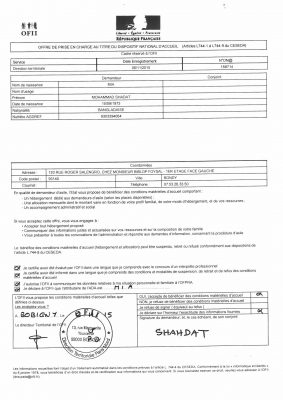Last updated: March 2025
As an asylum seeker, you will benefit from social rights during your procedure. This means that you are normally entitled to: health cover (social security), reduced transport fares, accommodation, a monthly allowance (ADA ) in the form of a payment card which does not allow you to withdraw money but only to pay in certain authorized stores.
These social rights are called CMA « Conditions Matérielles d’Accueil » (material reception conditions)
Important : CMAs may be refused or withdrawn in the following cases:
– Refusal to go to the region referred by the OFII or departure from the region
– Refusal of the offer of accommodation made to you
– Submission of a request for reconsideration of your asylum application
– Application for asylum out of time, without a legitimate reason
– Departure from the place of accommodation offered to you
– Failure to comply with the requirements of the asylum authorities (absence from interviews, failure to present yourself to the authorities, lack of useful information to facilitate the examination of applications …)
– Concealment of financial resources
– Giving incorrect information about your family situation
– Filing several asylum applications under different identities
In that case, it could be relevant to make an appeal : please go to an association.
As of July 2024, the OFII’s decisions refusing or terminating the CMAs can be challenged within 7 days, under a so-called “special” procedure, in which a single judge rules urgently, within 15 days. The compulsory prior administrative appeal (RAPO) has been abolished. The person concerned may request the appointment of a court-appointed lawyer.
The appeal may be summary in nature, seeking the simple annulment of a decision.
The hearing takes place before a single judge appointed by the president of the court. The asylum seeker may make observations, and may be provided with an interpreter, and be assisted by a lawyer, who may be appointed by the court.
Deadline for ruling: the judge has fifteen days from the date of registration of the application to make a ruling.
There are other reasons for the OFII to remove or refuse the CMA. Don’t hesitate to go to association if the OFII removed or refused the CMA and you think the reason is not justified.

